#Social services
Text
Just a heads up:
If you are on Medicaid in the US you probably have not had to renew your coverage since March of 2020.
You WILL have to renew this year. The first renewal packets are getting sent out this month (March 2023). If you do not respond to them your Medicaid coverage will be terminated.
If your coverage is terminated, you have 90 days to appeal before you need to start the whole application process over again.
Please watch for this packet and fill it out if you get it! Don’t lose your coverage!
9K notes
·
View notes
Text
One of the most common criticisms of "housing first" initiatives (programs to provide housing for unhoused people unconditionally without gatekeeping) is that housing first "does not improve mental health."
Now, let's set aside for the moment that this criticism is irrelevant -- the purpose of housing is to provide shelter, not to "improve mental health" -- what definition of "mental health" could possibly make this true? As much as I try to critique and deconstruct the social construction of "mental health," how could it possibly be true that having a safe, assured place to live would not result in greater happiness, greater inner peace, less depression, less anxiety, less negative emotions, than living on the street?
What possible definition of "mental health" would not be improved by being housed rather than unhoused?
Answering this requires unpacking the wildly different, almost completely unrelated, definitions of "mental health," one applied to relatively privileged people, and one applied to oppressed people.
For relatively privileged people, the concept of "mental health" is centered on emotional well-being, introspection and self-awareness, and the mitigation or management of negative emotions like pain, depression, anxiety, and anger.
For oppressed people, the concept of "mental health" is centered on compliance, obedience, and productivity.
Like most privilege disparities, this isn't binary. For most people who are privileged in some ways and marginalized in other ways, "mental health support" will include some degree of the emotional support given to privileged people, and some degree of the compliance and productivity training given to oppressed people, with the proportions varying on where exactly each person falls on various privilege axes. All children are oppressed by ageism, so all children's "mental health" has some elements promoting compliance, obedience, and productivity. But relatively privileged children may also receive some emotional support mixed in, while children of color, children in poverty, and children with existing neurodivergence labels will receive a much higher ratio of compliance training to emotional support.
One of the clearest illustrations of this disparity is the contrast between the "self-care" recommended to privileged people, and the "meaningful days" imposed on oppressed people.
Relatively privileged people are often told, by therapists, doctors, mental health culture, and self-help books, that they are working too hard and need to rest more. They're told that for the sake of their mental health, they need work-life balance, self-care, walks in the woods, baths with scented candles. Implicit in these recommendations is that the reason these people are working too hard is because of internal factors, like guilt or emotional drive, rather than external factors, like needing to pay the bills and not being able to afford a day off.
By contrast, unhoused people, institutionalized people, people labeled with "severe" or "serious" or "low-functioning" mental disabilities, are literally prescribed labor. Publicly funded "mental health initiatives" require the most marginalized members of society to work tedious jobs for little or no pay, under the premise that loading boxes at a warehouse will make their days "meaningful" and thus improve their "mental health." And unlike the self-care advice given to relatively privileged people, the forced-labor-for-your-own-good approach is not optional. People are either forced into it directly by guardians or institutions, or coerced into it as a precondition to access material needs like housing and food.
The form of "mental health" applied to relatively privileged people has some genuinely useful and beneficial elements. We could all stand to introspect and examine our own feelings more, manage our negative emotions without being overwhelmed by them, have self-confidence. We all need rest and self-care.
Still, privileged mental health culture, even at its best, is deeply flawed. At best, it tends to encourage a degree of self-centeredness and condescension. It's obsessed with classifying experiences as "trauma" or "toxic." It's one of the worst culprits in feeding the "long adolescence" phenomenon and generally perpetuating the idea that treating people as incompetent is doing them a kindness. Even the best therapists serving the most privileged clients have a strong tendency towards gaslighting and "correcting" people about their own feelings and desires.
But perhaps the worst consequence of privileged mental health culture is that it gives cover to the dehumanizing, abusive, compliance-oriented "mental health care" forced upon the most marginalized people. Privileged people are encouraged to universalize their experiences with sentiments like "We all deal with mental health" or assume that the mild, relatively benign "mental health care" they experienced are the norm, so what are those silly mad liberation people complaining about?
Tonight, I listened to a leader from an agency serving unhoused people talk about how "Everyone struggled with mental health during the pandemic"... and then later mention that their shelter categorically excludes people with paranoid schizophrenia diagnoses.
So perhaps "everyone struggles with mental health," but only certain people are categorically excluded from services, from shelter, from autonomy, from basic human rights, because of how their brains happen to work.
As always, it seems like so much effort in the mad liberation/ neurodiversity/ antipsychiatry movement is spent holding the hands of relatively privileged people receiving relatively privileged "mental health care" and reassuring them that we're not trying to take it away from them. Fine, it's great that you like your antidepressants and anti-anxiety medication and your nice therapist who listens to you and your support group. Great. Go live your best life. But that has nothing to do with our fight against forced drugging, forced labor, forced institutionalization, forced poverty. It's not even close to the same "mental health."
#mad pride#universal housing#neurodiversity#anti psych#ableism#social services#mental health#poverty#housing#housing crisis#capitalism#late capitalism
3K notes
·
View notes
Text
Non disabled people will take services away from disabled people and then cry about how their gran never gets any help
Wonder who's fault that is
Have fun in the hole u dug for yourselves
#queer#disabled rights#disability#disabled#disability pride month#disabled pride#cripple punk#social services#ableism#ableist rhetoric
309 notes
·
View notes
Text
Here are resources for if you're like me, living below the poverty line, with or without disabilities
Everyone is allowed to exist, to take up space, to have and eat food, to have housing and warmth and medical care. the USA does NOT make this easy. It should, but it prioritizes companies and the wealthy over it's citizens.
There are resources you can use if you're making less than 30% of the median income in your area in most places. You can find out what it is via google, by looking up your county's social services website. Not social security, social services.
If you're relying exclusively on SSA programs like Social Security Disability Insurance (SSDI) or Supplemental Security Income (SSI), you ARE below that income level.
If you have a disability that keeps you from working, like severe anxiety, depression, a severe mental impairment or a light sensitive/stress sensitive medical condition like a seizure disorder or a heart issue, or most kinds of movement issues that bar you from meeting requirements like being able to lift over 50 pounds, you can talk to your doctor, get documentation, and apply for that assistance. There is no shame in applying. Just remember you should think about what you can do on your *worst* days, not on a good day. Exclusively think about your worst days when you're asking your doctor or applying for assistance, because those worst days are what are keeping you from working, or losing employment opportunities.
You can apply for SSA online, but be prepared for an in person interview, and assessment by a doctor of their choosing. If you're denied, get a lawyer. They can help you appeal and they get paid only when you get approved, so they're highly motivated to get you approved.
Things that are available to you if you're under that median income, regardless of whether you're on an SSA:
Department of (vocational) Rehabilitation-- It might go by another name in your state, but they can help you get testing for neuro divergent conditions like ADHD or Autism, address physical limitations, and help you find education, therapies to allow you to work around your issues, and help you find employment that meets your needs. This is available to you if you've been out of the workforce for a long time, as well, for whatever reason. Whether you were a home maker, or you were serving time.
Ticket to Work--A program available through social security. You can apply for this if you've been on social security for a while, and you feel like you're ready to reenter the work force. You will be given a list of companies that work with social security, and you're likely to work fewer hours or under the minimum wage. Your social security may be lowered based on your income with the program, so that's something to keep in mind.
Unemployment (through your social services branch), available if you've lost your job via firing, generally not if you've quit, to my knowledge. You have to prove you're actively seeking employment, and check in a few times a week or a few times a month based on your situation and location. Be prepared with printed out proof of your applications being turned in. Put it in a binder with plastic sleeves, use dividers to mark batch dates. The more professional you make it look the better.
Disability leave income-- This is dependent on your employer, in a lot of places, but it could be available to you. You can, and should, seek medical assistance if you're injured on or off the job to the point where it's severely impairing your work. If it's to a point where you're unable to work with accommodations, but it's recoverable, apply for disability. If it's not recoverable, apply for social security
Section 8 housing-- Available through HUD (Housing and urban development), usually a lottery or a waitlist. You have to make sure you pay attention to when applications open, and have proof of income available. Have your proof of income ready, wherever your income comes from.
Low income housing--Available in a case by case basis, first come first serve, and they generally prioritize disabled people, elderly, and families, especially families with young children or single incomes. The HUD.gov website has an interactive map that will show you it's locations, and the locations of housing that is taxpayer funded, or other forms of low income assisted programs. You apply for these on an individual building basis, and waitlists can be months to years long depending on your chosen location's population density (In san francisco, for instance, a waitlist for a low income place can be eight or more years long) You'll also need to have proof of income ready.
Charities for low income people are available to help you with deposits and first months rent, or rent for a month when you're in a pinch (One month per each 12 month period) in most urban locations. 211 can help you find these resources
Medicaid--Apply through your social services office, or social security if you're receiving it. Social services will require yearly renewal, social security will keep it up to date for you.
SNAP benefits-- You apply through social services, and you need to have all your documents ready. Proof of income, your rent information, formal or informal (either through a formal landlord or an agreement between you and your roommate or parents) as well as proof of bills and residency. If you have social security this is now available to you in most places. Use it
Cash aid--Not available to people who have social security, but it IS available to people on unemployment, disability leave, or who are generally under employed. You apply for this through social services when you're applying for SNAP.
Reduced public transit fare, or gas cards--Available in limited locations, usually urban. You should look up whether it's available in your area, and whether you have to apply through your medical insurance provider, through the transit authority office, or through your social services case worker. It's different everywhere. If you struggle with transportation, it's vital you apply.
Utility assistance--Either through the provider, or through your city. You should be prepared to offer your proof of income, whether it's social security, or SNAP, or sometimes even proof of public medical, as well as proof of residency (your lease and or official government mail, like the DMV, or financial mail like a bank statement or a utility bill)
Phone or internet assistance--Via the Federal Communications Act. Applications are only available until February 7, 2024, but your internet provider may put the cut off for turning in proof of acceptance as today (February 6, 2024), and this program will likely only be available until April. You can receive either internet assistance (up to 30 dollars), or a free cell phone with data up to one gig. You cannot get both.
Food banks. So many food banks. You have to google where they are in your area, and they may not have a lot of the things you would normally eat. A lot of it is the food people think is 'ugly' or is bordering on stale or about to hit it's expiration date, but food is food, and food close to it's expiration date can still be eaten up to two weeks after the date in a lot of cases. It's best to look up what can be eaten past it's expiration, but it's possible in a lot of situations. You just have to get really creative with what they give you. You can use these once a month, and be prepared to be honest about how many people you're feeding. If there are multiple unrelated adults in a household, you have to go separately. (I don't personally use them because I have allergies and cross contamination can be a real problem with this option. They may not have kosher or halal food, especially if it's through a christian church, and they're not likely to have meat) Some food banks will deliver if you have mobility or transportation issues.
Pet food banks--The ASPCA has these listed on their website. You can use them once monthly for pet food, clean up supplies, or pet toys. It's based on what they have available, it's not always going to be a lot, and they recommend you try other sources first, or have a back up plan. But if you need to cover a gap, it's an option. Some places have delivery as an option.
If there's a program I don't have listed, it's likely I don't know about it, and I encourage you to add it to the list. Enlighten me. Maybe there's something you know about that I don't, and it's something I can use.
Disclaimer: I don't know anything about programs or resources for unhoused people. I have been unhoused, but in that period I did not know to look for resources, and that was more than twelve years ago, now.
#poverty#poverty resources#social support#social security#social services#food insecurity#housing insecurity#section 8#low income#unemployment#underemployed#disabled#vocational rehabilitation
64 notes
·
View notes
Text
SSI is a purposefully convoluted system of bureaucracy that is made to be difficult to understand/navigate and you cannot change my mind.
i should not have to call one office to ask a question about information i was told yesterday in the same office, only to get condescended upon and given a second office to call.
i should not call the second office and get once again condescended to because of the question i had. not only was i condescended to, i was condescended to over questions i did not even ask. and when i had the gall to correct the person on the phone for the question i was actually asking, i was spoken to like i couldn't understand basic information about the program.
the system made to 'help disabled people' is nothing more than a thinly veiled program designed to keep people poor and not asking questions, because you should be grateful for the $943 that you're given a month even if its barely enough to live off of.
#cav who gets shit done#sadie#this post is made out of anger#this system is so fucked up and doesnt work#disability is only $240 a month or so#but if you receive SSDI then you cant receive SSI#so the amount you receive can only total to $943 and its so FUCKED#not even to mention the massive amount of energy it takes to have to call the offices and get sent on a wild goose chase bc none of them#have their shit in order or good communication with one another#and god forbid you have a straight forward question about something you were told BY A WORKER IN OFFICE#< sadie wrote these#disability rights#disabled#SSI#SSDI#social security#social services#disability#disability benefits
11 notes
·
View notes
Text
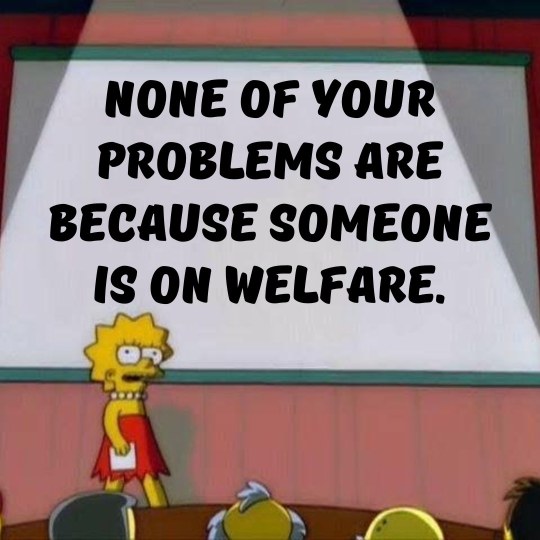
22 notes
·
View notes
Text

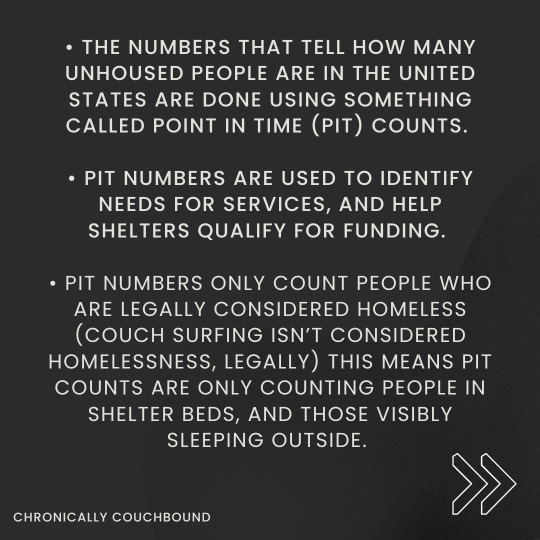
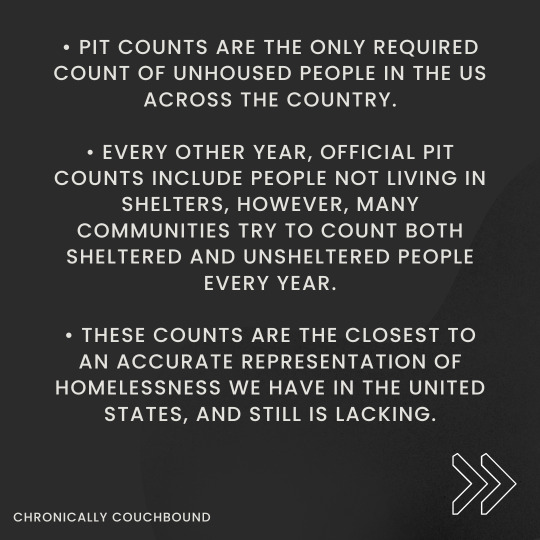
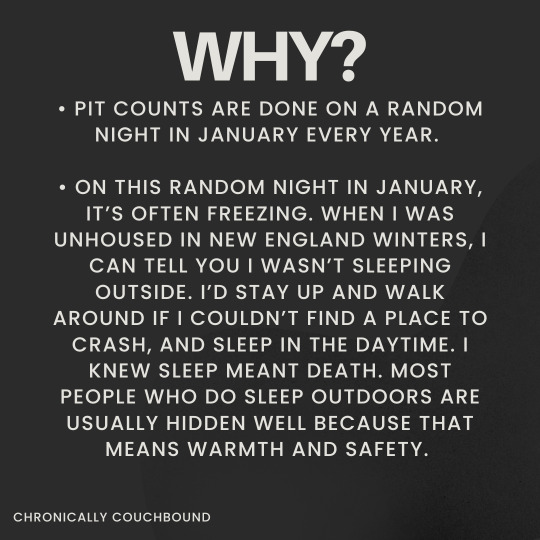


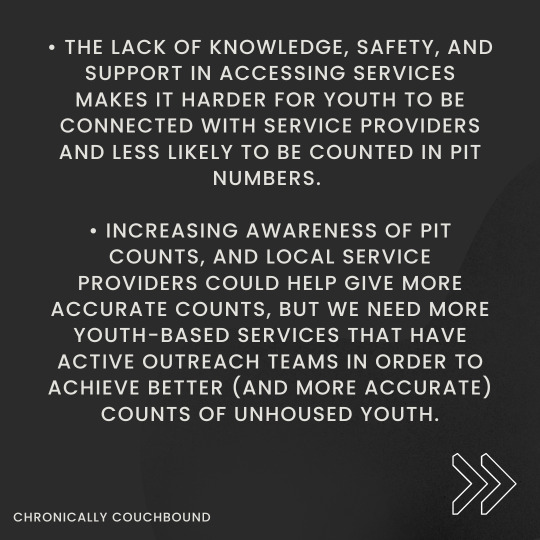
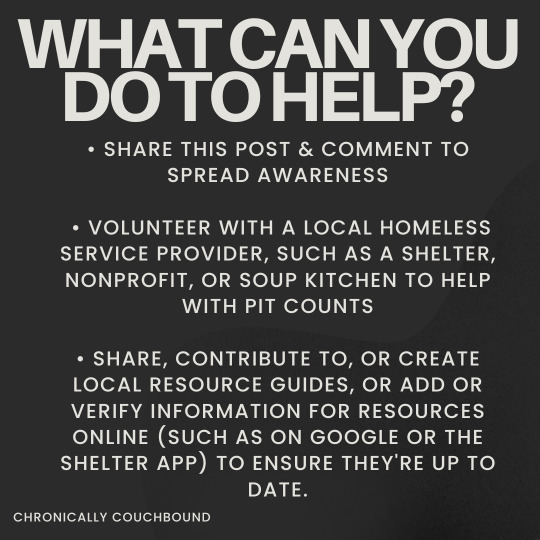

Some info about Point In Time counts and statistics around homelessness in the United States!
[ID: Slide 1 of 9, White text on a grey background reads: "Any statistics around homelessness are greatly under-represented, here's why" next to an arrow directing to the next slide, at the bottom, it reads "chronically couchbound"
Slide 2 of 9, in the same style, reads "The numbers that tell how many unhoused people are in the United States are done using something called Point In Time (PIT) counts." the bullet point below it reads: "PIT numbers are used to identify needs for services, and help shelters qualify for funding." The last bullet point reads: "PIT numbers only count people who are legally considered homeless (couch surfing isn’t considered homelessness, legally) This means PIT counts are only counting people in shelter beds, and those visibly sleeping outside."
Slide 3 of 9, in the same style, bullet points read: "Pit counts are the only required count of unhoused people in the US across the country." the next reads: "Every other year, official PIT counts include people not living in shelters, however, many communities try to count both sheltered and unsheltered people every year." The final bullet point reads: "These counts are the closest to an accurate representation of homelessness we have in the united states, and still is lacking."
Slide 4 of 9 reads: "Why?" at the top of the page, below reads bullet points: "PIT counts are done on a random night in January every year." the other bullet point reads: "On this random night in January, it’s often freezing. When I was unhoused in New England winters, I can tell you I wasn’t sleeping outside. I’d stay up and walk around if I couldn’t find a place to crash, and sleep in the daytime. I knew sleep meant death. Most people who do sleep outdoors are usually hidden well because that means warmth and safety."
Slide 5 of 9, in the same theme, bullet points read: "Most shelters simply do not have the funding to staff outreach workers to go out to do full PIT counts. Even if they have the funding, it’s hard to find unhoused people, so staying out the whole night as an outreach worker is difficult." the next bullet point says: "From unofficial counts done similarly to PIT counts in warmer months, it’s easy to see booming numbers of unhoused people. More people aren’t unhoused in the summer, it’s just less dangerous to sleep outdoors."
Slide 6 of 9, in the same style, bullet points read "PIT counts especially misrepresent unaccompanied youth, disabled people, and other marginalized people, because they’re often couch surfing or more hidden from the public while homeless. Couch surfing is not legally considered homelessness." The next bullet point reads "Many communities report zero unaccompanied unsheltered youth, which is often inaccurate in reality." The final bullet point reads: "Lack of youth shelters, and beds in youth shelters, play a huge part of this discrepancy."
Slide 7 of 9, in the same style, bullet points read: "The lack of knowledge, safety, and support in accessing services makes it harder for youth to be connected with service providers and less likely to be counted in PIT numbers." The next bullet point reads "Increasing awareness of PIT counts, and local service providers could help give more accurate counts, but we need more youth-based services that have active outreach teams in order to achieve better (and more accurate) counts of unhoused youth."
Slide 8 of 9 reads: "What can you do to help?" at the top of the page, below reads three bullet points: "Share this post & comment to spread awareness" The next bullet point reads: "Volunteer with a local homeless service provider, such as a shelter, nonprofit, or soup kitchen to help with PIT counts" The final bullet point reads: "Share, contribute to, or create local resource guides, or add or verify information for resources online (such as on Google or the shelter app) to ensure they're up to date."
Slide 9 of 9, the text reads : "Follow for more: Chronically Couchbound" Below the text is the logo, a white silhouette of a house, in front of it, a black silhouette of the disability symbol, and behind it, a light grey "prohibited" sign. The logo is on a black square background. End ID.]
#chronically couchbound#homeless#unhoused#houselessness#houseless#homelessness#chronically homeless#couchsurfing#couch surfing#has id#homeless statistics#protect homeless youth#homeless youth#chronic homelessness#poverty#social services#homeless shelter#soup kitchen#point in time counts#pit counts#housing crisis#cost of living#capitalism#abolish capitalism#anti capitalist#abolitionist#leftist#socialism#communism#leftism
26 notes
·
View notes
Text
youtube
Finland Solved Homelessness: Here's How (Spoiler: It's More Than Housing First)
10 notes
·
View notes
Text
Mccarthy is a piece of shit, like all Republicans, but he was the MODERATE piece of shit, the one who was basically the only one telling the outright fascist insurrectionist Republicans "No", which is why they held up his confirmation as Speaker in the first place; This is the first time a Speaker of the House has ever been removed through the official means, and it was started by the worst of the worst. They kicked him because he wouldn't cave to their insane demands for TOTAL GUTTING of dozens of agencies, they kicked him because he refused to end WIC and a dozen other social services, they kicked him because he wouldn't bend to Russian influence in the GOP and wouldn't stop sending aid to Ukraine. This is chaos caused by fascists in Congress.
11 notes
·
View notes
Text
Timeline of SNAP Changes at the End of the Public Health Emergency
So way back when the pandemic started, the US government ramped up SNAP. Not by a ton, but they did provide some “extra” benefits (emergency allotment, extra money for people with children who normally received free or reduced-priced lunches) and made it easier to enroll in SNAP for certain people (students and non-working adults).
Like the Medicaid allowances during the pandemic, these are largely ending March-August 2023.
The major changes are as follows:
MARCH: If you are considered to be an able-bodied adult without children, you will again have a time limit for receiving SNAP. You may also again have a work requirement to receive SNAP.
MARCH: The “Emergency Allotment” (extra SNAP funds) that started early in the pandemic for most SNAP recipients will end in late March 2023.
MAY: If you have kids who qualify for free or reduced-priced meals at childcare centers, and were receiving money to cover the cost of meals at home for parents temporarily working from home, this money will end May 13th 2023 (the assumption being that all children who are going back to daycare are back in daycare, and parents aren’t paying for lunches at home on daycare days).
JULY: If you are a college student, you will no longer be eligible for SNAP unless you meet pre-pandemic guidelines starting in July 2023.
AUGUST: If you have kids that qualify for free or reduced-priced meals at school, and were receiving money to cover the cost of meals at home during virtual school, you will no longer receive that money starting fall semester 2023 (the assumption being that all children are back in the classroom and the risk that they will go virtual again is low- so parents are no longer at risk of having to pay for weekday breakfast and/or lunches).
33 notes
·
View notes
Text

Does anyone know what this means? It was on my appendix D for the requested documents part of the medicaid application. I haven't been able to get any answers and its too late to call the number. I don't know if thats something I should have already or something I need to get. My caseworker won't call me back or respond to my email. I tried looking online but I'm so confused.
And if I do need the screening I don't think I'd be able to get it done before November 19th which is when the documents are due. I'm trying to apply as a person with disabilities who is medically needy (I make too much to normally qualify for medicaid, but I have high medical and living expenses)
#wrenfea gets medicaid#medicaid#health coverage#social services#chronic disability#chronic pain#spoonie#disability#chronic illness#fibromyalgia#degenerative disc disease#im literally in tears im so confused and overwhelmed
7 notes
·
View notes
Text
tried to appeal my disability decision to get a hearing and they straight up told me i couldn’t add evidence beyond what i already gave them.
isn’t the point of an appeal to be able to show ALL of the evidence you have? i legitimately don’t understand.
anyway i just had to wait until it expired and just reapplied with a fuck ton more things wrong with me and probably more on the way tbh.
my local ssa is going to be seeing a lot of me because apparently they pulled almost none of my medical records even though i provided clinic and hospitals and specific doctors all with phone numbers and locations.
i am just so done. onto my third year of attempting to get disability.
#octobercowboy screams#octobercowboy semiverbal#octobercowboy health#octobercowboy disability#ssa#social services#social security#disability benefits
3 notes
·
View notes
Text
Download website template for non profit, NGO or fundraiser organization.
#fundraiser#ngo#donations#donate if you can#child health#volunteering#charity#donate#gofundme#church#social services
4 notes
·
View notes
Text
Please join me THIS SUNDAY 1/22/23 @ 3pm PST, 4PM CST, 6pm EST for a Healthcare ACA "Obamacare" Live Stream. Learn how to apply, understand, how the program works and if you might qualify. Do you need Healthcare? Join me and ask your questions!
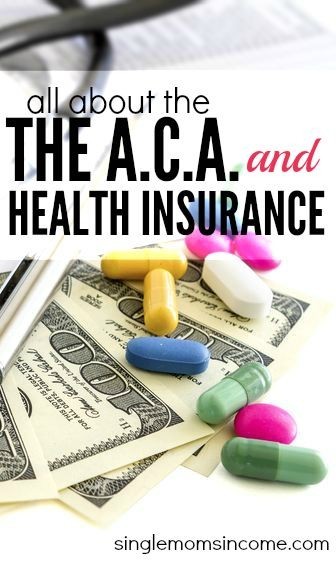
#obamacare#affordable care act#food stamps#medicaid#medicare#health insurance#health#social issues#social services
43 notes
·
View notes
Text
Can y’all pray for this girl I met?
So I was on the bus yesterday, going home from school. As I got on the bus, I noticed a lady who looked like she was sleeping on her seat. No big deal, people get cozy on the bus sometimes, they even close their eyes sometimes, it doesn't necessarily mean they're actually asleep. So I just stand near the back which is where people go if all the seats are occupied.
But eventually the bus stops at a bus stop and I notice a police car stopped in front of us. The driver gets out of the bus and talks to the police. Then a police officer comes and he starts talking to the lady who was resting. Now, I have been the victim of police brutality before. I know wha it's like. This woman is visibly BIPOC, and she looks to be either Latina or Indigenous. She looks poor. She could be having a mental health crisis. I know what police do to people like her. I'm not about to let her get murdered or beaten up or something. So I start filming. I don't say anything, I just take out my phone and start filming.
I know we're on a bus and beside a busy road, so if there is any maltreatment, people will see. But I also know that there are many cases where people got killed on or by a busy road. I've watched a video of a mentally ill man getting gunned down by the police even though he was just standing with his hands up, and this happened right by a busy road full of cars. If anything happens, having video evidence of it will back up and lend credibility to eyewitness accounts. If anything happens, having video evidence of it will make more people believe the truth.
So I film, from a few meters away. The police officer asks her if she has a ticket for the bus. She says no. He demands that she get out of the bus. She refuses at first. But he threatens to take her out by force. Now I will mention that she looks extremely tired and groggy and she doesn't seem to be thinking rationally. The police officer threatens to arrest her, so she gets off the bus. The cop follows her, and I follow the cop, still filming. Outside, the cop threatens to arrest the girl, and asks for her information. He notices me filming and asks if he can help me. I say no, and that I'm just making sure.
The lady seems completely delirious. She can only answer yes or no, and her voice sounds incredibly distressed and emotional. The police officer eventually gets into his car and drives away. And I stop filming but I stay with the lady. She's sitting on a bench and I sit beside her. I ask her if she has any friends or family she can go to. She can't answer my questions in full sentences and just says no in a very panicked voice. I ask her if she wants to go to a homeless shelter, and she says no. I have to talk to her and repeat the same question four or five times to get an answer. The police officer had previously had to ask the same question many times to get an answer as well.
I know I can't leave her like this. She's completely out of it and if she's outside by herself by the time night rolls around, then she might get kidnapped. I've seen too many missing posters around my city, and read too many articles about the MMIGW2S crisis. Not to mention, she doesn't have any warm clothes, she only has a cotton t shirt and slacks, and the nights are very cold where I live. She could straight up die of pneumonia or something if she doesn't find shelter before the night. So I decide to call a homeless shelter anyways and explain my situation. They tell me to call a number and there will be a crisis response team who will come.
So the crisis response team is not part of the police. They don't have weapons. They're social workers who use deescalation tactics and stuff.
So I call the number for the crisis response team. And at this point she's lying down on the bench at the bus stand and I'm sitting on the ground next to her. Which is okay, since she's really tired and I'm not. I get put on hold on the phone, and I stay put on hold for like half an hour. So I'm just sitting here, keeping an eye on the lady, waiting to be connected on the phone to someone I can talk to. And it's pretty tense, but thank the gods the weather is good.
Eventually the call does get through. The lady on the other side of the phone line asks what happened and where I am. So I explain my situation to her. She says she'll send a crisis response team, but they'll take at least half an hour to get there. So that's okay I guess. So I stay with the distressed lady. I don't try to talk to her. I just let her rest. The gods know that she needs her rest. I just want to make sure she doesn't end up kidnapped or the victim of police brutality or a suicide victim or something. I want her to rest in a soft, clean bed inside instead of having to sleep on a hard metal bench outside. But for the time being I just let her rest.
So eventually the crisis support team gets here. They have a car, and they are two ladies. They're really nice. They ask her questions, and she is finally able to talk in full sentences, instead of only saying yes or no. This is a good thing. But the answers she gives still don't make sense. When the crisis response ladies ask her if she's staying with anyone, she says that she's staying with family. But when they ask if she knows the phone numbers of any family members, she replies that she doesn't have any family. When they ask her how she got to where she is now, she replies that she walked. Which I know is not true since I was on the bus with her and I got off said bus with her.
She keeps insisting that she needs to go back to where she was staying, she wants them to take her to where she was staying. She keeps begging to have help so she can go back. But when the ladies ask her what address she needs to go back to, she says she doesn't know. When they ask her if she has anyone's phone number that she could call, she responds that she doesn't know any phone numbers. She sounds incredibly distressed this whole time.
Eventually she says that she was trying to get to a bank, and so they ask her if she might be able to lead them to where she's staying if they start from the bank she was trying to get to. She says that maybe she can. She gets in the car with them and the three ladies drive off. So after this, I stay at the bus stop and I take the next bus home. So I have no idea what happened to her beyond that. But I do trust the lady at the homeless shelter call line who told me to call the crisis response team. And I do trust the crisis response team because they're not cops, and they're very gentle and kind.
I sincerely hope that she gets the help that she needs and that she enters into a better mental state. I hope she gets back to her home and that she can be safe and comfortable. I hope she receives healthcare and mental healthcare because she clearly needs both. This is coming from someone who clearly needed both at one point too. I was extremely undernourished and suicidal once and going to the hospital kept me from dying. I hope that she gets the help that she needs. I hope that so much with all of my heart.
I am keeping her in my prayers, and I would really appreciate it if you guys could pray for her as well. I hope she can have the blessings of all the gods. I believe in the power of prayer and I believe in the power of love. I believe in the power of kindness, compassion, humility, empathy, and dignity. If you could all pray for her, it would mean an immense amount to me and I would be very grateful.
#original post#police#fuck the police#cops#police misconduct#mental illness#community#bus#public transit#public transport#social work#social workers#mental breakdown#mental issues#mental ill health#acab#1312#acab1312#all cops are bastards#safety#social services#services#spiritual#spirituality#faith#prayer#pray
5 notes
·
View notes
Text
#corporate#corporate america#benefits#fiscal policy#politics#politicians#responsibility#Walmart#profits#capitalism#capitalist society#american capitalism#social services#janet yellen#shareholders#free market system#free market#tax payers#united states#USA#reality#subsidized workforce#workforce#livable wages#tax dollars#taxes#political#political climate#eat the rich#lessons
2 notes
·
View notes